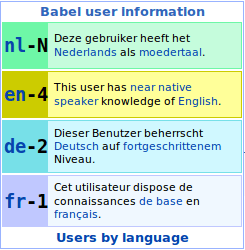
Identifying language abilities has been real popular. The “Babel templates” are quite popular on the English Wikipedia and, many of the literally hundreds of templates have been copied to other wikis.
With a limited knowledge of a language, people can be really effective execute many tasks. It helps however when they are addressed in an understandable way.
At translatewiki.net we have been using the Babel extension for a long time; it does not use any templates and all the languages used in any of the WMF projects are supported. As it has been in use for so long, it became really rich in localisations.
 Using the Babel extension is easy; my Babel user information for instance can be seen to the right and the syntax for this box can be seen below.
Using the Babel extension is easy; my Babel user information for instance can be seen to the right and the syntax for this box can be seen below.
{{#babel:nl|en-4|de-2|fr-1}}
There have been many requests for the implementation of the Babel extension particularly by the newer and smaller projects. As people can choose to use this functionality and as it is particularly useful to people who are active on many projects, it has been implemented on all WMF wikis.
Thanks,
Gerard Meijssen
Internationalization / Localization outreach consultant

Can you help us translate this article?
In order for this article to reach as many people as possible we would like your help. Can you translate this article to get the message out?
Start translation